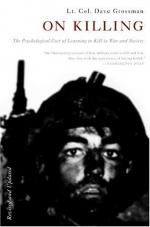
|
| Name: _________________________ | Period: ___________________ |
This quiz consists of 5 multiple choice and 5 short answer questions through Section 2, Killing and Combat Trauma: The Role of Killing in Psychiatric Casualties: Chapter 5, The Wind of Hate | Section 2, Killing and Combat Trauma: The Role of Killing in Psychiatric Casualties: Chapter 6, The Well of Fortitude.
Multiple Choice Questions
1. In Chapter 1, Grossman reveals that the majority of active World War II soldiers did what?
(a) Released prisoners-of-war.
(b) Learned German.
(c) Self-harm.
(d) Declined to fire their weapons.
2. In the study cited by Grossman at the end of Chapter 5, what stimulus was applied to test dogs?
(a) Loud noises.
(b) Electric shocks.
(c) Rotten food.
(d) Extreme cold.
3. How many days can a soldier remain in combat before psychological trauma begins to manifest itself?
(a) 150.
(b) 200.
(c) 60.
(d) 10.
4. What occurs as a result of exhaustion after the 60-day mark of continuous combat?
(a) Narcolepsy.
(b) Muscle atrophy.
(c) Death.
(d) Hallucinations.
5. Which Civil War officer does Grossman quote at the beginning of Chapter 5?
(a) McClellen.
(b) Jackson.
(c) Sherman.
(d) Pickett.
Short Answer Questions
1. In Chapter 2, what tactic does Grossman describe as key to training soldiers to fire in combat?
2. At the end of Chapter 4, what physical reaction to exhaustion and hunger does Grossman cite?
3. Which of the following is not a sign of psychological trauma discussed in Chapter 1?
4. At the end of Chapter 4, what reason does Grossman give for the increase in firing and killing in recent wars?
5. What percentage of casualties did cannon fire comprise in many Civil War battles?
|
This section contains 215 words (approx. 1 page at 300 words per page) |

|




